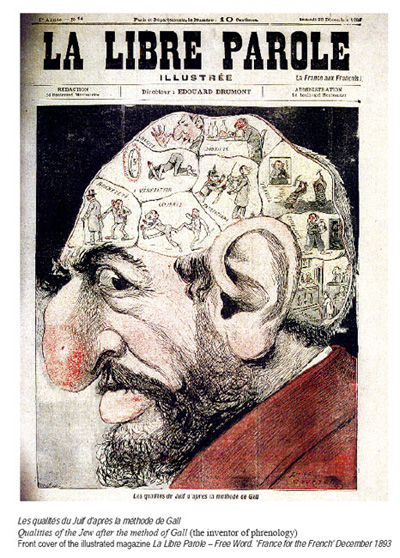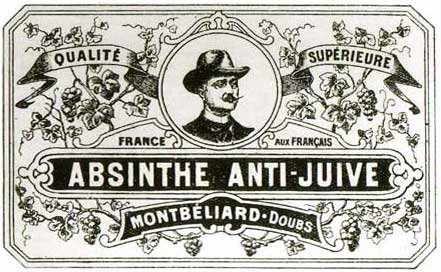Raymond Rudorff, Belle Epoque
The Dreyfus Period (2): Anti-Semitism
Anti-Semitism in France did not begin with the Dreyfus affair. It had already been a factor in French life for some years and it became especially prominent after the publication in 1886 of a violent and inflammatory book, La France Juive, by the journalist Edouard Drumont. The main theme of the book was that the Jews had been responsible for France's misfortunes and failures ever since 1870 and that they were menacing the livelihood and fortunes of honest Frenchmen. The book became a best-seller almost overnight and led to a spate of others in the same vein. In 1889, a French National Anti-Semitic league had been founded but it soon collapsed, although not because of any great waning of anti-Semitism in the country. Paris became the centre of organised racism and several publishers could be relied upon to print anti-semitic books. Wealthy Jews in banking, business and society were arousing resentment among the more conservative middle classes-especially after the scandalous revelations of the Panama canal affair. [A financial fiasco, in which French financial interests sought to repeat their success in building the Suez canal by spanning the Isthmus of Panama. The effort failed only after bribes to government officials kept the operation going long after it should have been terminated. Thousands of French families lost their savings.]In 1891, in the French Parliament, the fireeating, ultra-right-wing nationalist, Paul Déroulède, who had been baying for years for a war "of revenge" against Germany, accused the Jews of wanting to "de-christianise France", and a month later another deputy demanded the expulsion of the Rothschilds [a wealthy Jewish banking family]from the nation's soil. In 1892, prejudices were stirred up still more strongly by a newspaper La Libre Parole, which Drumont founded, and which became the most prominent of several openly racist sheets. A number of ugly scenes occurred in the capital. In 1894, a group of law students founded the Paris Students' Anti-Semitic League which held public meetings, broke up gatherings of Jews and Socialists, noisily demonstrated and generally encouraged mob violence and anti-Jewish feelings. In June 1895, it paraded through the streets, although only some hundred members took part. In 1896 there were several more public meetings, an attempt to stone the home of the Rothschilds, and to disrupt lectures by Jews or pro-Jews.
La Libre Parole soon became the most influential paper of its kind. In May 1892, it began to publish a series of articles under the heading The Jews in the Army in which the growing number of Jewish officers was denounced as a danger to national security. Naturally, when names were mentioned, challenges to duels tended to ensue and were regarded as the normal outcome. Drumont himself fought a Jewish army officer, Cremieux-Foa, and then, in another duel, the rabidly anti-semitic Marquis de Morès, a leading patron of La Libre Parole, killed a Jewish army officer, Captain Armand Mayer. The affair was a public scandal: in a statement to the press, the Marquis declared that he regretted the death of Mayer but added, "We are at the beginning of a civil war"; and his words were echoed by many other papers in the city, most of which denounced the killing of a French officer. There was a sudden revulsion against the excesses of the anti semites, and thousands of sympathisers followed the captain's funeral procession. But in 1893, when prominent politicians and financiers were involved in a scandal arising out of revelations of corruption in the dealings of the Panama Canal Company, the Jews were again accused of being responsible for the spread of corruption in high places, while wild rumours circulated in the corridors of Parliament, the newspaper offices, clubs and the Stock Exchange. The Libre Parole, thanks to its influential connections, was one of the best-informed papers and it became one of the most widely read and feared in Paris, with a circulation of more than 200,000. . . .
In October 1894, the Libre Parole published a brief account of the arrest of a Jewish staff officer accused of passing secrets to the Germans and began asking questions about the case. On Novem ber 1, 1894, it appeared with a huge headline: "HIGH TREASON - ARREST OF THE JEWISH OFFICER A. DREYFUS". A month later, as the trial was about to take place before a military tribunal, Drumont's paper was claiming that Dreyfus -- whose guilt was taken for granted -- was probably only a tool of the Jewish financiers in France and part of a vast, nation-wide Jewish plot to betray the French people and deliver them unarmed and unprepared into the hands of the enemy -- Germany.


Anti-Semitic Label from a Bottle of Absinthe